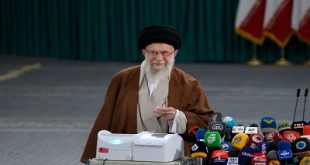Move follows criticism from Republican lawmakers over the introduction of an AI-enabled laptop.

A few licenses that permit businesses to export products, such semiconductors, to Huawei Technologies, a Chinese company that is under sanctions, have been withdrawn by the United States.
According to a person with knowledge of the situation, certain businesses received notice on Tuesday that their licenses were canceled with immediate effect.
The action follows the launch of Huawei’s first AI-enabled laptop, the MateBook X Pro, which is equipped with Intel’s recently announced Core Ultra 9 processor, last month.
Republican senators criticized the laptop launch, claiming it implied that Intel had been granted the go-ahead to sell the chip to Huawei by the US Department of Commerce.
The Commerce Department issued a statement stating, “We have revoked certain licenses for exports to Huawei,” though it did not say which ones.
The measure, which was first announced by Reuters, is the result of sustained pressure from Republican China hawks in Congress, who have been pressuring the Biden administration to act more forcefully to block Huawei.
Republican Congresswoman Elise Stefanik stated in a statement that “this action will bolster US national security, protect American ingenuity, and diminish Communist China’s ability to advance its technology.”
The action may also harm Huawei, which still depends on Intel chips to power its laptops, and US vendors that work with the company, depending on whether licenses were revoked.
An Intel representative declined to provide a statement.
Remarks were not immediately answered by Huawei.
In 2019, as part of a larger attempt to hinder China’s capacity to strengthen its military, Huawei was added to the US trade restriction list due to concerns that it may spy on Americans. The company’s suppliers must apply for a unique, challenging-to-obtain license before shipment if they are added to the list.
Nevertheless, suppliers to Huawei have been granted licenses worth billions of dollars to sell Huawei products and technology. One particularly contentious license was granted by the former President Donald Trump’s administration, which permits Intel to supply central processors to Huawei for use in its laptops starting in 2020. Since obtaining a license from US authorities in 2020, Qualcomm has supplied older 4G chips to smartphones. Qualcomm stated earlier this month in a regulatory filing that it
Nonetheless, Qualcomm continues to license its whole suite of 5G technology to Huawei, which started utilizing a 5G processor created by its HiSilicon division last year and that most experts assume is produced in defiance of US restrictions. In the filing this month, Qualcomm stated that it has begun talks to extend its patent agreement with Huawei, which expires early in Qualcomm’s fiscal 2025.
An inquiry for comment was not immediately answered by Qualcomm.
Critics contend that the company’s comeback is partly due to these licenses. Despite US export prohibitions on both businesses, Huawei stunned the market last August with a new phone that was powered by a sophisticated chip made by SMIC, a Chinese chipmaker.
The device contributed to a 64% increase in Huawei smartphone sales year over year in the
Sadly, the information provided is vague as to what specifically led to Huawei’s smartphone sales to rise by 64%. Nonetheless, based on press accounts, we can determine what led to the increase:
China’s Smartphone Market Growth: Sources suggest that Huawei is making a comeback in its home country of China. The successful introduction of the 5G-capable Mate 60 series and Huawei’s well-established brand reputation are cited as contributing factors to this growth [Counterpoint Research].
Unveiling a Popular product: Although a particular product has not been mentioned, it is probable that a new Huawei smartphone—possibly the Mate 60 series—performed remarkably well and greatly increased sales.
Emphasis on the Premium Segment: Counterpoint Research reports that Huawei’s success in the high-end smartphone market (>$600) served as a catalyst for their comeback. This can be the result of a well-liked high-end gadget.
Huawei’s Rebound: The Influence of Luxury
Sales of Huawei smartphones have reportedly increased by 64% year over year, marking a remarkable comeback. Analysts point to a strategic move by Huawei: a renewed emphasis on the luxury smartphone category, even though the precise explanation is still unknown.
Their prior approach of gaining market share across all price points is in contrast to their current focus on high-end products, which are usually priced above $600. The action implies a deliberate attempt to restore brand profitability and reputation following setbacks in the previous years.
For Huawei, the premium market offers a number of benefits. First off, these phones’ larger margins result in a noticeably higher revenue per phone sold. Second, high-end phones frequently contain cutting-edge features and inventive technology that can restore


